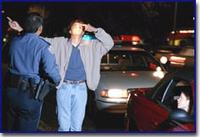Too Drunk to Drive, Too Sober to Patrol
 It's a well-intentioned law, I admit that. But DC's DUI laws are hurting innocent people, and it's time they were changed.
It's a well-intentioned law, I admit that. But DC's DUI laws are hurting innocent people, and it's time they were changed.After the Washington Post ran an article earlier this week about Debra Bolton's legal troubles, people are starting to notice. And it's about time.
In most states, the legislature has set a legal limit for the maximum concentration of alcohol in the blood when driving, usually 0.08%. This is generally acknowledged as a simplistic solution to a complex problem. We all know someone who can drink way more than they ought to, and still act sober. We also know people that drink very little and still stagger about. What this means is that not everyone reacts the same way to the same concentration of alcohol.
To even things up, many states having two threshold levels. In Maryland, for example, driving with a blood alcohol content of 0.08% is illegal -- period. You will be charged with DUI in that case. If the BAC is between 0.07% and 0.08%, that is considered prima facie evidence of DWI, and you will probably be charged. Between 0.05% and 0.07%, you may be charged with DWI, if your other actions indicate that you not only ingested alcohol, but that you are impaired by it. Below 0.05%, you are not considered impaired by alcohol.
This system gives police a little leeway to evaluate drivers straddling the fuzzy line, where some might be perfectly safe, while others are clearly unable to safely drive. Of course, there are cases when police make poor decisions, but the law does limit the policeman's ability to make judgments that aren't backed by evidence. He couldn't declare someone with a 0.15% BAC to be sober, nor could he declare someone at 0.02% to be drunk.
Not so in Washington, DC, where the law gives the policeman all the latitude he needs to make judgment calls. Driving at 0.08% or higher is an automatic DUI charge, but a police officer may charge any individual with DUI, based solely on his judgment, regardless of blood alcohol levels. As a result, hundreds of people are charged each year with DUI or DWI, despite having blood alcohol levels of 0.03% or lower.
How low is 0.03%? An average woman who drinks a single glass of wine with dinner, over the course of an hour, will typically score about 0.03%. Ever seen a woman sip a single glass over an hour, then stagger down the street drunk? Me neither.
But some DC police go even further. This year they even charged a computer programmer who registered a perfect 0.00% on the scale, because in the officer's judgment, he was drunk.
The vast majority of these cases are dropped without conviction, generally for lack of evidence. But that doesn't mean they don't matter. It can cost thousands of dollars to contest a DUI charge. And being found innocent in court doesn't mean your insurance company will consider you innocent -- or even the DMV. According to Corey Buffo, the general counsel for the DC DMV,
"Our burden of proof is lower.... Not enough evidence for them may be enough evidence for us."You you get pulled over on a bum charge, the officer decides he doesn't like you, and he charges you with DUI. You spend thousands of dollars to prove you're innocent, but your license is still suspended. When you finally get it reinstated, your insurance has doubled.
All those in favor of responsible legislation, raise your glasses. Unless you plan on driving home tonight.
Labels: alcohol, dc, nanny state, personal freedoms
 Fresh political views and news from a Jeffersonian point of view, featuring both domestic politics and news from the war. For a good look at my political views, read my
Fresh political views and news from a Jeffersonian point of view, featuring both domestic politics and news from the war. For a good look at my political views, read my
<< Home